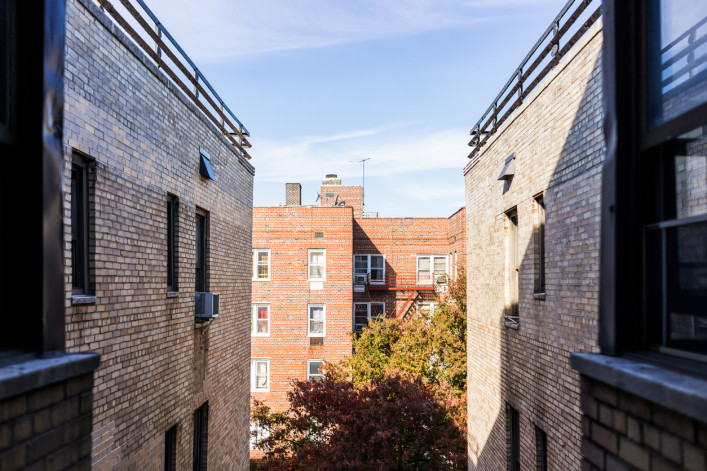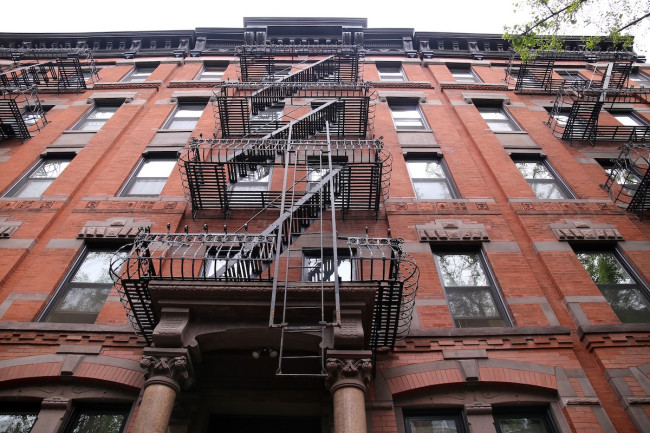Stakes are high as tenant activists, landlords square off in NYC rent reform fight

Tenant activists want to end vacancy deregulation, but landlords see it as a way of turning affordable units into market-rate apartments.
iStock
As the fight gears up over rent reform, tenants and landlords are trying to work out how they could be affected by proposed changes. The stakes are high: According to the Community Service Society of New York, rent regulation protects 365,000 low-income households in the city, twice the number living in public and subsidized housing.
Many of the city’s Democratic representatives were voted in last November on promises to protect tenants, but landlords are worried their bottom line will be affected. They say the plans remove incentives to keep buildings well maintained, and could shrink rental inventory as buildings convert to condos or co-ops.
Some of the most significant issues being hammered out involve vacancy deregulation, upgrades that allow landlords to raise rents, real estate campaign finance contributions, and conversion laws, which, like rent reforms, are up for renewal in June.
Vacancy deregulation
Tenant activists want to end vacancy deregulation, but landlords see it as a way of ultimately turning affordable units into market-rate apartments.
Ending vacancy deregulation would mean maintaining and even adding to the inventory of affordable, rent-regulated units in NYC. It would also give tenants more security if landlords are less incentivized to cycle them out.
“Everyone knows, once you are in a rent-regulated apartment, you don’t leave. It’s the culture of New York City,” says Elizabeth Stone of Stone Realty Management. If you move out, the unit can be upgraded and the rent raised over the $2,774.76 threshold, removing it from the city’s rent-regulated inventory.
Some landlords see vacancy deregulation as a light at the end of the tunnel. Stone manages a property that’s 100 years old and has had to put in new gas lines and elevators. “Not being able to deregulate—it’s hard to make that money back,” she says.
The Citizens’ Budget Commission, a non-profit backed by some big NYC real estate organizations, wants to steer the conversation towards high earners living in rent-stabilized apartments. Stone says she has 21 rent-regulated apartments in one of her buildings. “Eight [households] are in real need. The rest are not. I had to have the elevator shut down and some [tenants] said they’d go upstate for the weekend,” she says.
But Michael McKee, treasurer of the Tenants Political Action Committee, says when it comes to affordable housing, these units rented by high earners represent a “drop in the bucket.”
“This has a negligible impact on the market if any. Six thousand units have been deregulated [like this] over the last 25 years. But there are 300,000 to 400,000 units affected by vacancy de-regulations,” he says.
Ending vacancy decontrol is far from guaranteed. In the past, the governor has, instead, increased the threshold for deregulation. These are “piddling improvements,” says McKee, that do nothing.
Unit upgrades that push up rents
Major capital improvements and individual apartment improvements are upgrades that enable landlords to hike rents on stabilized units. McKee says the program is “rife with fraud.”
However, Stone insists that without the MCI rules, there’s no incentive for landlords to make improvements to their buildings. McKee disputes this, saying upgrades benefit a landlord simply by increasing the value of their property, by making savings on operations like heating and through the opportunity for federal tax benefits.
McKee says “either you’re on one side or the other. You either think tenants need protections or you think there’s a system—there’s no middle ground. Our enemies have a lot of power, their money is the rent we pay them.”
Campaign finance reforms and their effect on tenant rights
Another area where there is pressure for reform is campaign finance. Politicians, Cuomo among them, insist donations don't affect policy but McKee says tenants have every reason to be suspicious of Cuomo's motives. McKee says lowering these contributions is as important as rent reforms.
“It’s the only way we are going to get big money out. Real estate lobbyists are all over Albany and their tactics are stealth and cash. They do it behind closed doors and with their checkbooks,” he says.
Conversions could remove rental inventory
The Citizens' Budget Commission warns we could see rental buildings convert to condos or co-ops as landlords seek ways to remove units from rent regulation if other routes are denied. This would reduce the inventory of affordable housing even further. McKee agrees, “which is why they need to tighten the laws around these conversions. They sunset at the same time as the rent laws,” he says.
Another area where battle lines are being drawn is in the enforcement of rent rules, which falls to The Office of Rent Administration.
“Enforcement is disastrous,” says McKee but if it comes down to stronger rent laws or stronger enforcement, he says he'll take stronger rent laws.
You Might Also Like





























